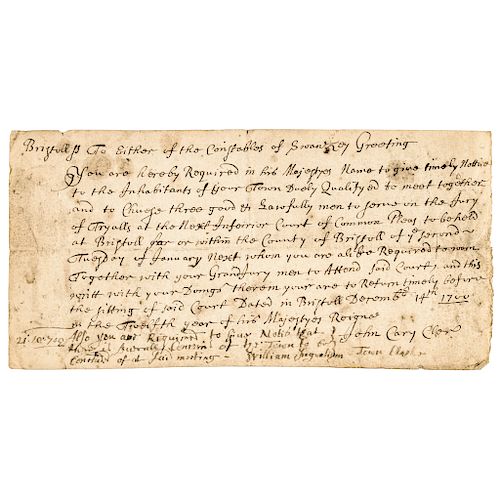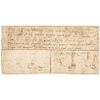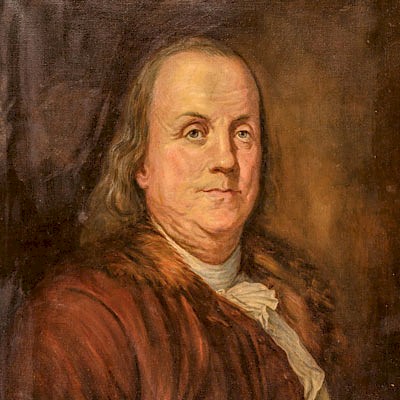1700 Colonial Manuscript Document Summons for Jury Duty members, Swansea, Mass
Lot 99
Estimate:
$400 - $500
Absentee vs Live bid
Two ways to bid:
- Leave a max absentee bid and the platform will bid on your behalf up to your maximum bid during the live auction.
- Bid live during the auction and your bids will be submitted real-time to the auctioneer.
Bid Increments
| Price | Bid Increment |
|---|---|
| $0 | $10 |
| $200 | $20 |
| $300 | $25 |
| $500 | $50 |
| $1,000 | $100 |
| $2,000 | $200 |
| $3,000 | $250 |
| $5,000 | $500 |
| $10,000 | $1,000 |
| $20,000 | $2,000 |
| $30,000 | $2,500 |
| $50,000 | $5,000 |
| $100,000 | $10,000 |
| $200,000 | $20,000 |
| $300,000 | $25,000 |
| $500,000 | $50,000 |
About Auction
By Early American History Auctions
Aug 24, 2019
Set Reminder
2019-08-24 12:00:00
2019-08-24 12:00:00
America/New_York
Bidsquare
Bidsquare : Autographs, Colonial Currency, Political Americana, Historic Guns
https://www.bidsquare.com/auctions/early-american-history-auctions/autographs-colonial-currency-political-americana-historic-guns-4347
Historic Autographs • Colonial Currency • American Civil War Colonial Era • Revolutionary War • Political Americana • Black History Early American History Auctions auctions@earlyamerican.com
Historic Autographs • Colonial Currency • American Civil War Colonial Era • Revolutionary War • Political Americana • Black History Early American History Auctions auctions@earlyamerican.com
- Lot Description
Colonial America
Notice "choose three good & Lawfully men to serve on the Jury of Tryalls at the next Interior Court of Common Pleas"
December 14, 1700-Dated early Colonial Era, Manuscript Document Summons for Jury Duty members, Swansea, Massachusetts, Fine.
This original Manuscript Legal Summons Document for "Jury Duty" to the Constables of Swansea, Mass. which measures about 3.75" x 7.5", 1 page. A legal Summons made to, "Either of the Constables... Greeting You are hereby Required in his Majesty's Name to give timely Notice to the inhabitants of your town Duly Qualified to meet together and choose three good & Lawfully men to serve on the Jury of Tryalls at the next Interior Court of Common Pleas...". Signed at bottom "John Cary", also Signed on reverse "Joseph Mason". Soiling, edge chips with large Docket on reverse. A very rare early Colonial Mass. Summons for Jury Duty members!
Joseph Mason (1663-1748) held many offices in the town of Swansea, Mass. and served as one of the Selectmen during the years 1704, 1705, 1706 amd 1707. He served also as Town Clerk during this period. In 1707 and 1708 he served as Representative to the General Court of Mass and in July of the year 1709 was ordained pastor of the Second Church of Swansea and so continued until his death. He was a shoemaker by trade. A few years before his death the Province line was changed and the section of Swansea in which le lived was set off to Rhode Island. His will was therefore dated and recorded in Warren, RI, which town, ingreater part, was formed from territory taken from Swansea and given to Rhode Island. He died May 19, 1748 and is bured in the old family cemetry on his son's homestead in Warren, a short distance from the Massachusett's line.
John Cary, son of John, b. Nov. 4, 1645; m. Abigail, dau. of Samuel Allen and his second wife, Margaret (French) (Lamb), at Bridgewater, Dec. 7, 1670. In 1680 he removed to Bristol, where he resided till his death in 1721. The deed to his land in Bristol was granted Sept. 14, 1680, and confirmed by the General Court, Sept. 29, 1680. The first meeting of the people and the naming of the town was Sept. 1, 1681, and John Cary and his brother David were present. He became a prominent man in the town, and was elected a Deacon of the Church at its organization, and held the office till his death.
He was one of the first "raters" of the town, and appointed Nov. 10, 1681; in 1693 was recording officer of the County, and Clerk of the peace; in 1694 was Representative to the General Court. His wife was also of good family; her father, Samuel Allen, came from Bridgewater, Eng., to Braintree in 1630; in 1635 he took the oath of allegiance, and was Town Clerk, Selectman, Surveyor of highways, Constable, and served as Deputy three times.
He and his son Samuel, who settled in Bridgewater in 1660, both fought in King Philip's War. For eight generations this family has been identified with the best political and religious life of New England. He d. July 14, 1721, his estate amounting to 700 pounds; the will of his wife was recorded in 1729.
- Shipping Info
-
Early American provides in-house worldwide shipping. Please contact us directly if you have questions about your specific shipping requirements.
-
- Buyer's Premium



 EUR
EUR CAD
CAD AUD
AUD GBP
GBP MXN
MXN HKD
HKD CNY
CNY MYR
MYR SEK
SEK SGD
SGD CHF
CHF THB
THB












